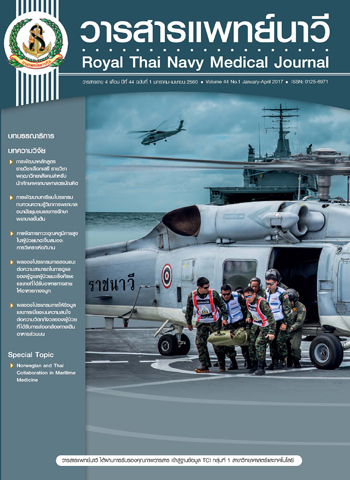The Development of an Elective Course: Social Gerontology for Bachelor of Nursing Science Students
Main Article Content
Abstract
The purpose of this study was to develop an elective course entitled “Social
Gerontology for Bachelor of Nursing Science Students”. The study was divided into four
phases, namely, 1) need assessment, 2) course development, 3) pilot course
implementation, and 4) course evaluation. The need assessment involved documentary
analysis and focus group discussions. Participants included 18 nursing instructors, 24
nursing students, 20 professional nurses working in community hospitals and health
promoting hospitals, and 24 older persons living in Maung District, Lampang Province. Data
were analyzed using qualitative content analysis. The need assessment results were input
into initial course development involving 8 nursing instructors who served as the curriculum
development committee. The draft of the elective course was then validated and reviewed
by 3 experts. The researcher and the curriculum committee improved the course in
accordance with the experts’ advice. The revised course was then implemented with 45
second year nursing students. Each student was assigned to work collaboratively with an
older person (45 older persons in total) throughout the course. The course was comprised
of 30 hours of classroom teaching and learning experiences and 18 hours of experiential
learning with older persons. The course evaluation included: observation and tests of
student’s achievements in five domains of learning outcomes stipulated in Thailand
Qualifications Framework (Nursing), student’s satisfaction toward the course, and student’s
competency in older person care. Data were analyzed using descriptive statistics, namely,
mean and SD.
Article Details

This work is licensed under a Creative Commons Attribution-NonCommercial-NoDerivatives 4.0 International License.
References
สำนักงานสถิติแห่งชาติ. การสำรวจประชากรสูงอายุในประเทศไทย พ.ศ. 2557. กรุงเทพมหานคร: เท็กซ์ แอนด์ เจอร์นัล พับลิเคชั่น; 2557.
สำนักงานคณะกรรมการพัฒนาการเศรษฐกิจและสังคมแห่งชาติ. รายงานทิศทางของแผนพัฒนาเศรษฐกิจและสังคมแห่งชาติ ฉบับที่ 12. กรุงเทพมหานคร: สำนักงานคณะกรรมการพัฒนาการเศรษฐกิจและสังคมแห่งชาติ; 2558.
กระทรวงการพัฒนาสังคมและความมั่นคงของมนุษย์. พระราชบัญญัติผู้สูงอายุ พ.ศ. 2546. พิมพ์ครั้งที่ 5. กรุงเทพมหานคร: เจ. เอส. การพิมพ์; 2550.
World Health Organization (WHO). Active Ageing, A Policy Framework. [Internet]. [เข้าถึงเมื่อ 27 สิงหาคม 2559]. Available from: https://www.who.int/hpr/ageing/ageingdiscussion.pdf.
จรวยพร ทะแกล้วพันธุ์, ศรีประไพ อินทร์ชัยเทพ, รุ่งนภา สูตินันท์โอภาส, ปานจันทร์ อิ่มหนำ. การประเมินหลักสูตรพยาบาลศาสตรบัณฑิต ฉบับปรับปรุง พ.ศ. 2555. ลำปาง: วิทยาลัยพยาบาลบรมราชชนนี นครลำปาง; 2559.
Good CV. Dictionary of Education. New York: McGraw-Hill Book; 1973.
วิชัย วงษ์ใหญ่. การพัฒนาหลักสูตรระดับอุดมศึกษา. พิมพ์ครั้งที่ 2. กรุงเทพมหานคร: อาร์ แอนด์ ปริ้นท์; 2554.
Taba H. Curriculum development: theory and practice. New York: Brace & World; 1962.
Tyler RW. Basic Principle of Curriculum and Instruction. Chicago: University of Chicago Press; 1949.
ระวี สัจจโสภณ. แนวคิดทางการศึกษาเพื่อการพัฒนาภาวะพฤฒิพลังในผู้สูงอายุ. วารสารวิทยาสารเกษตรศาสตร์ สาขาสังคมศาสตร์ 2556;34(3):471–90.
Lawton MP. Environment and other determinants of well-being in older people. Gerontologist 1983;23(4):349-57.
คณะกรรมการส่งเสริมและประสานงานผู้สูงอายุแห่งชาติ. แผนผู้สูงอายุแห่งชาติ ฉบับที่ 2 (พ.ศ.2545-2564). กรุงเทพมหานคร: สำนักนายกรัฐมนตรี; 2545.
Kolb DA. Experiential Learning. New Jersey: A Simon & Schuster Company; 1984.
กิตติคม คาวีรัตน์. การเรียนรู้เชิงประสบการณ์เพื่อสร้างเสริมสุขภาวะของนักศึกษา มหาวิทยาลัยราชภัฎ. [วิทยานิพนธ์ดุษฎีบัณฑิต สาขาหลักสูตรและการสอน]. มหาวิทยาลัยศิลปากร; 2553.
นิดา ลาภศรีสวัสดิ์. การพัฒนาทักษะการเรียนรู้จากประสบการณ์จริงของนักศึกษาโครงการแลกเปลี่ยนนักศึกษาระหว่างสถาบันเทคโนโลยีพระจอมเกล้าเจ้าคุณทหารลาดกระบังกับมหาวิทยาลัยในประเทศญี่ปุ่น. เอกสารประกอบการประชุมวิชาการทางการศึกษาระดับชาติครั้งที่ 2 “การพัฒนาประสบการณ์การเรียนรู้ในชีวิตจริง: การศึกษาเพื่อการพัฒนาอย่างยั่งยืนไปสู่ประชาคมอาเซียน. วันที่ 11 พฤษภาคม 2555; ม.ป.ท.: หน้า 1–9.


